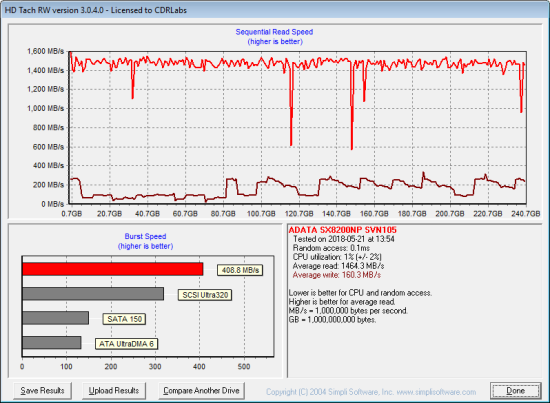TRIM Performance:
While SSD's offer many benefits, there are some downsides to using flash memory. One of the biggest issues people run into is performance degradation. Over time, an SSD will run out of fresh blocks and will have to write over data the file system has marked as deleted. This procedure is very complicated and can slow an SSD's write speeds considerably.
To fix this problem, most manufacturers have added TRIM support to their SSDs. The TRIM command allows an operating system, such as Windows 7, to tell an SSD which data blocks are no longer in use. Using this information, the drive pro-actively erases these blocks and adds them to the free block pool.

To test the SX8200's TRIM and garbage collection functions, I first put the drive in a "dirty" state. I used Iometer to fill the entire drive and then ran a random write test for 30 minutes. Looking at the screenshot below, you can see that the SX8200's average read and write speeds dropped to 360.0 MB/s and 66.1 MB/s, respectively.

ADATA XPG SX8200 - Dirty
To see how well the SX8200 could recover, I let the computer sit for about 30 minutes and then reran the test. The drive's average read speed jumped back up to 1464.3 MB/s. However, its write speed lagged behind, averaging out at only 160.3 MB/s.

ADATA XPG SX8200 - After TRIM
Lastly, I used Parted Magic to perform a secure erase on the SX8200. With the drive wiped clean, it had average read and write speeds of 1622.8 MB/s and 1113.2 MB/s, respectively.

ADATA XPG SX8200 - Secure Erased
Final Thoughts:
While not the fastest or most feature packed PCIe SSD to come through the 'Labs, the ADATA XPG SX8200 delivers a lot of bang for your buck. This compact, M.2 form factor SSD is powered by Silicon Motion's SM2262 controller and is available with up to 1TB of Micron's 64-layer 3D TLC NAND flash. Combine this with an ultra-fast PCIe Gen3 x4 NVMe 1.3 interface and you have a drive capable of delivering nearly six times the performance of your average SATA 6Gb/s SSD. In our sequential read and write tests, the 240GB version of the SX8200 was able to read at speeds as high as 3,179 MB/s and write at speeds in excess of 1,179 MB/s. The drive also did relatively well in our random write tests, producing more than 176,000 IOPS at low queue depths.
Of course, fast read and write speeds aren't the only things the XPG SX8200 has to offer. In addition to a large DRAM cache buffer, the drive uses an intelligent SLC caching to boost read and write performance. The SX8200 also features advanced LDPC error correction technology, data shaping, and a RAID Engine to ensure data integrity and extend the lifespan of the SSD. To top it all off, the drive is backed by a 5 year warranty.
The XPG SX8200 is available now in 240GB, 480GB and 960GB capacities. Prices on Amazon.com start at $100 for the 240GB version and go up to $400 for the top of the line 960GB drive.

Highs:
- Available in 240GB, 480GB and 960B capacities
- PCIe 3.0 x4 interface with NVMe protocol
- Silicon Motion SM2262 controller
- Equipped with Micron 64-layer 3D TLC NAND
- Good sequential and random read and write performance
- RAID Engine, Data Shaping and LDPC ECC technologies
- Small M.2 2280 form factor
- Intelligent SLC caching
- Large DRAM cache
- Includes heatsink
- Works with ADATA's SSD Toolbox software
- Reasonably priced
- 5 year warranty
Lows:
- Write speed drops considerably when SLC cache is full
- Does not support hardware based encryption

